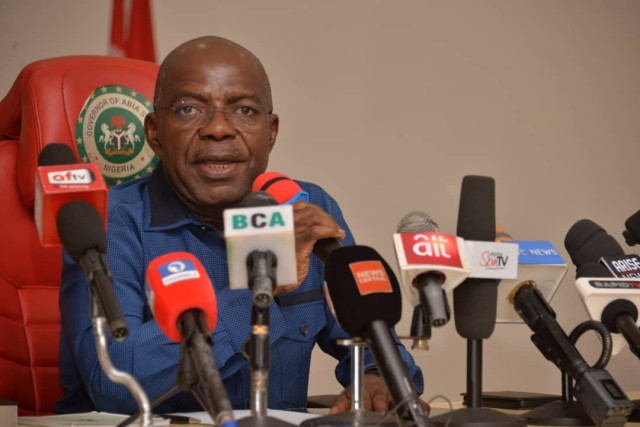Abia State Governor, Alex Otti, expressed that the proposal for creating an additional 31 states, as advocated by various ethnic groups during the ongoing review of the 1999 Constitution, would impose a significant economic strain on Nigeria.
He characterized the review as a chance for Nigerians to redefine the governance of their country.
Otti made these remarks on Saturday during his address at the South-East Zonal Constitution Review for Abia and Imo States, organized by the House of Representatives Committee on Constitution Review.
Represented by his Deputy, Ikechukwu Emetu, Otti encouraged citizens from both states, irrespective of their political views, to actively contribute to the reform of the amended 1999 Constitution.
“I will present my thoughts on key issues for discussion in the constitutional review process for 2025. Many in this audience may recognize that the ideas I will share are not entirely new, as they have been documented in my writings and public discussions over the past decade," he stated.
Nevertheless, he emphasized that his opinions should not overshadow the valid concerns of other stakeholders who have the right to disagree and propose alternative perspectives.
It is crucial for everyone to have input in this process, and he expressed gratitude for the opportunity provided through public hearings.
Otti expressed his concern regarding the push for new states. While acknowledging the proposals for 31 new states submitted to the National Assembly, he stated a preference for addressing the economic burden these proposals could inflict on the nation's already limited resources through increased administrative costs and an expansion of bureaucracy.
“Unless we can discover independent financing sources for the proposed new states outside of the current funding, I do not share the optimism of advocates for adding more states to the existing 36,” he remarked.
He urged the adoption of an inclusive governance model at the sub-national level to alleviate fears of marginalization.
“My recommendation is to develop a governance model in the states that allows all major clans to participate in resource allocation, decision-making, and advancing their political and economic interests."
The governor stressed the need for priorities to be placed on enhancing state economies, generating job opportunities for youth beyond civil service roles, and prioritizing the welfare of the general population.
He criticized the current system for being too elite-driven, asserting that it's time to place ordinary citizens at the forefront of decision-making.
Regarding calls for state police creation, Otti recognized the escalating insecurity in Nigeria as an urgent national concern.
He argued that the existing federal policing system is inadequate and has left citizens vulnerable for years.
“I support the creation of state police, provided that standards regarding leadership, relationships with federal entities, recruitment, accountability, and respect for human rights are established,” he added.
Otti endorsed increasing the number of seats for women in national and state assemblies.
He noted that while this would promote women's participation in politics and influence the governance framework, mere presence in legislative bodies won't suffice without addressing fundamental issues.
He highlighted the need to strengthen internal political party processes to actively involve women in decision-making.
“We must ensure that ordinary women, not just those connected to influential male party leaders, are central to this initiative.
If we aren't careful, we could unintentionally allow vested interests to solidify their control through proxies, which would not significantly alter the political landscape for average Nigerian women.”
On the proposal to recognize local government councils as a separate tier of government, Otti urged caution.
He indicated that, like the creation of additional states, there is a risk of overloading the bureaucratic framework. He warned that this could lead to an influx of bureaucratic structures managing local councils autonomously.
“The local government is mandated to provide essential services such as healthcare and education that significantly affect grassroots communities. Would it be financially sound to establish over 774 universal basic education commissions and similarly numerous agencies for local government services? What impact would this have on governance costs, corruption, and abuse?”
He called for a careful evaluation to determine whether to create new administrative layers that burden public resources with inflated expenses or to streamline bureaucratic processes to ensure efficient allocation of resources for social services.
On compulsory basic education, Otti affirmed that the proposal is in alignment with several international human rights agreements.
He stressed the importance of not only making education a fundamental right but also ensuring adequate financing for educational initiatives.
He called for investments in teacher education, especially in science and technology, ensuring that educators are equipped with relevant skills to prepare students for the global landscape.
“Teachers must be well-compensated and provided with a conducive work environment,” he emphasized.
Along with making education compulsory, he highlighted the necessity for adequate funding of the educational system, particularly basic education.
Otti acknowledged the many gaps in the 1999 Constitution that are exploited by various groups for self-serving aims.
However, he cautioned against solely blaming past leaders for today’s issues, arguing that we now possess enough governance experience to identify ineffective practices and make necessary adjustments.
He remarked that since 2010, the 1999 Constitution has been modified five times in response to public demands for structural changes, commending the nation for its willingness to challenge the status quo and implement essential reforms.




















